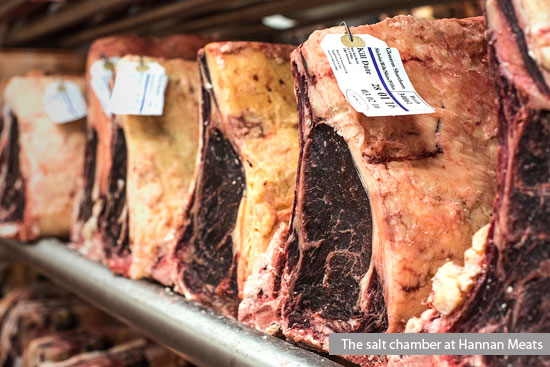Why 2016 is the Northern Ireland Year of Food
A city full of burgeoning restaurants and talented chefs coupled with a countryside stuffed with superb produce explains why 2016 is the Northern Ireland Year of Food. Chef Russell Brown visited Belfast to discover how the country is displaying itself on the world stage
Whenever you visit somewhere new, you tend to have preconceptions, and when I went to Northern Ireland for the first time in January, it's fair to say that I had my own.
Northern Ireland has a notable past but, without exception, everyone I talked to about my trip said: "That was then, this is now. It's about now and the future." They certainly aren't looking back.
My initial trip was centred on Belfast, with excursions north and south of the city. My overriding impression was of a vibrant area with an exciting and diverse hospitality industry, which was generous, engaging, high quality and with the benefit of some superb produce and producers. When I went back in February for a second visit, to attend the Belfast Focus on Food conference, my first impressions were only reinforced.
This year is the Northern Ireland Year of Food and there will be a series of events to showcase and raise awareness of the food industry in Northern Ireland for both locals and tourists globally. Tourism NI is the leading organisation behind the event, but there is also a wider agrifood objective of raising export sales, something which comes under the brief of Invest NI.
Each month of the year has been given a theme, with January being ‘breakfast' month, June ‘love dairy' month, and August ‘meat' month, for example. A range of toolkits are in place to help businesses get involved, and themed menus, breakfast events, cookery courses and demonstrations are already taking place. In October, the BBC Good Food Show will be held in Northern Ireland for the first time, and this will coincide with Food Fortnight, an annual celebration of food and drink.
Aine Kearney, director of business support and events for Tourism NI, said at the Focus On Food conference: "Food and drink are a key element of any visitor experience. The 2016 Year of Food is a way to differentiate Northern Ireland as an international destination. There is huge activity planned across the year."
John Hood, director of the food and tourism division at Invest NI, added: "We are using the Year of Food to promote Northern Irish products outside of the country. The main export markets are the Republic of Ireland, Great Britain, Europe and the Middle East. At present, 86% of produce is consumed in Northern Ireland and this is perhaps the wrong balance for profitability; hence, we are looking at highmargin markets such as Dubai."
Invest NI also has a significant presence at six major international airports this year, with the branding ‘Food and Drink NI' along with the slogan ‘Pure Natural Quality'. Hood says: "There is an opportunity to celebrate our produce at home and to promote it abroad."
Stellar talent
Deane has had businesses in Belfast for over 20 years, but he won a Michelin star in 1997 at his first restaurant, Deane's on the Square, in Helen's Bay, County Down. His early career included a spell at the Dorchester under Anton Mosimann, who had a profound influence.
Mosimann told him: "It's not about getting a star, it's what you do with it that matters."
The move into Belfast was a big one for Deane, with a refurbishment budget that escalated wildly and a partnership that
didn't ultimately work out. Taking on the debt the restaurant had accumulated and buying his partners out cost him nigh on £1m, and this was only the start of a rollercoaster ride that saw restaurants open and close along the way.
The top end of the business is what really excites Deane and, after a disastrous flood at the city centre site, making the decision to close the Michelin-starred restaurant and run only the brasserie must have been difficult.
This is a philosophy that obviously works: the star was regained in the 2016 guide and the team at Eipic give a strong sense of being happy and confident in what they do. In total, Deane now has seven restaurants across the city.
Other significant players are Yellow Door, which encompasses a large outside catering business, a wholesale service providing bread and pÁ¢tisserie and a number of delis, as well as providing the catering for prestigious venues such as the Ulster Museum.
Niall McKenna also has several businesses in Belfast, including James Street South, the James Street Bar and Grill, Hadskis and a cookery school. McKenna also has expansion on the cards, with a new restaurant called and Crew opening in the Titanic quarter and a second, as yet unnamed, site on Donegal Quay.
Open for business
The hotel market is also buoyant, with the city boasting a number of top hotels such as the Merchant, the Culloden Estate and Spa, the Fitzwilliam, Ten Square and Europa. Both the Europa and Culloden are part of the Hastings Hotel group, whose managing director, Howard Hastings, was instrumental in getting the 2016 Year of Food off the ground when he was chairman of the tourist board.
The latest project for the Hastings Hotel group is the redevelopment of Windsor House on Bedford Street into a 200-bed, four-star hotel with 16 serviced apartments, ground floor retail space, restaurants and bars and offices on the upper floors. This £30m project will create 150 new jobs and is expected to open in 2018.
As managing director of the group, one of Hastings' great passions has been developing strong links with growers and producers. The list of suppliers for the group is a real 'who's who' of top Northern Irish food producers.
Even the Europa, right in the centre of Belfast, has a herb garden and greenhouse on its roof. The group is committed to a large range of activities linked to the Year of Food, including putting in raised beds for growing herbs and vegetables at schools, and a number of the hotel's chefs will do talks and demonstrations.
Cross-country cuisine
Moving south from Belfast, a food-lover's tour would take in Shortcross gin, a small batch distillery on the Rademon Estate, and Wine & Brine, a recently opened restaurant in Moira owned by Chris McGowan, who returned home to Northern Ireland having spent a number of years working in London, primarily as head chef for Richard Corrigan.
Head north along the stunning coastal route and Bushmills Distillery is an obvious destination before reaching the Giant's Causeway.
Harry's Shack on the north coast won the Observer Food Monthly Newcomer award in 2015, and its sister restaurant, Harry's in Donegal, is equally renowned. Expansion is under way here too, with Harry's Wagon, a custom-built trailer that will serve takeaway versions of the Shack's food, coming to the Portstewart Strand.
A link between many of these businesses and a key factor in their success is the quality of regional produce. The Great Taste Awards results show a huge number of award-winning Northern Irish products - Abernethy butter, Broighter Gold rapeseed oil, McCartney's corned beef and Baronscourt venison to name just a few. Craft brewing, cider making and distilling are all significant in the area, too.
Perhaps one of the most well-known suppliers, however, is Hannan Meats, and its most renowned product its Glenarm Estate Shorthorn beef, which is aged in a Himalayan salt chamber. Owner Peter Hannan comes from farming stock; he was buying and selling cattle and sheep for his father at the age of 11 and running abattoirs by the age of 22 before forming Hannan Meats in 1989.
The relationship between Glenarm Estate and Hannan Meats has been hugely successful and now it is not only Shorthorn cattle from Glenarm Estate itself that Hannan supplies. As demand for the product has grown, an opportunity has been created for other farmers, both organic and non-organic, producing quality Shorthorn beef, to market their beef through the Glenarm brand.
A chance meeting between Hannan and Mark Hix at one of the chef's London restaurants accelerated the development of the salt chamber ageing process, which allows meat to be aged for significantly longer in a perfectly controlled environment. Typically, the beef is aged between 28 and 45 days, but Hannan has beef ribs in the chamber that are approaching a year old, with a sweet hay-like smell, completely dry and mould-free. Hix ended up taking the majority of the early production for his Tramshed restaurant and now buys all his beef from Hannan's for the restaurant.
There is no doubt in my mind that Northern Ireland's food and hospitality industry will continue to flourish, and there is a huge passion and energy for positive change. The 2016 Year of Food can only highlight the quality on offer and enhance the region's reputation.
Continue reading
You need to be a premium member to view this. Subscribe from just 99p per week.
Already subscribed? Log In













